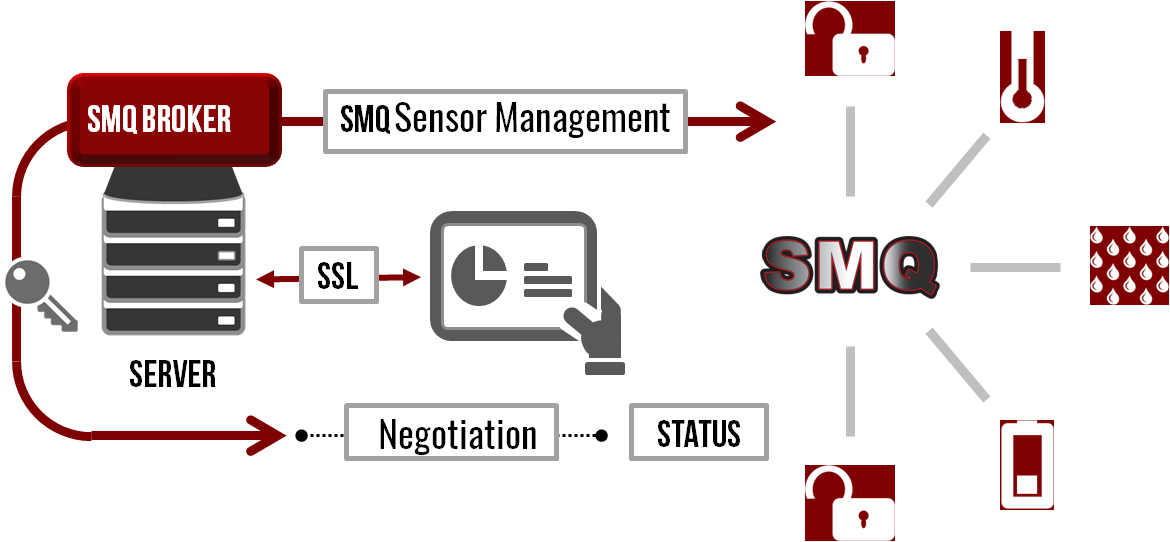SMQ is an easy to use machine-to-machine (M2M)/"Internet of Things" connectivity protocol that follows the publish subscribe design pattern.
Dependencies: EthernetInterface mbed-rtos mbed
Introduction
The SMQ Architecture is an Internet of Things (IoT) publish subscribe end-to-end solution that is optimized for embedded systems to provide instantaneous Device Edge Node connectivity, 1 to 1 Communications, and Ease of Transcending Firewalls. The solution is ideal for resource constrained devices that require real-time dynamic control, analytic information, and firmware updates in both LAN and WAN environments.
Architecture Component List
- SMQ C Client (Non-secure)
- SharkMQ (Secure) C Client
- SMQjs (Javascript)
- SMQ JAVA
- SMQ Broker

SMQ Client-example
A (non-secure) C Client implementation of the SMQ protocol demonstrating device control over the on board LEDs via any modern (WebSocket enabled) Browser interface.
- Code Size: 3kB
See Also
- SharkMQ (Secure) Client Example
- SMQ LED Demonstration Tutorial
- SMQ Documentation
- Real Time Logic LLC public SMQ Broker access.
- How to set up your own low cost SMQ Broker cloud server solution Tutorial.
How to setup your own SMQ IoT cloud server
Most IoT cloud server solutions, whether they provide ready-to-use hosted services or not, are based on a standard Virtual Private Server (VPS). Most developers probably think of Amazon or Microsoft Azure's services when considering the server side of their IoT solution. These high-end services are great if you need to scale up to millions of connected devices. However, for most small-scale operations and DIY projects, a low-cost VPS is more than adequate.
Diff: main.cpp
- Revision:
- 0:bd3aeb15634e
- Child:
- 1:734fa1459f69
--- /dev/null Thu Jan 01 00:00:00 1970 +0000
+++ b/main.cpp Wed Dec 03 23:54:54 2014 +0000
@@ -0,0 +1,66 @@
+
+#include "mbed.h"
+#include "ledctrl.h"
+#include "EthernetInterface.h"
+
+DigitalOut led1(LED1);
+
+//PATCH CTX
+extern "C" void mainTask(const char* uuid, int uuidLen, const char* devInfo);
+
+
+static const LedInfo ledInfo[] = {
+ {
+ "LED 1",
+ LedColor_green,
+ 1
+ }
+};
+
+
+extern "C" int
+ledState(int ledId, int on, int set)
+{
+ static int leds[sizeof(ledInfo)/sizeof(ledInfo[1])];
+ baAssert(ledId >= 1 && ledId <= sizeof(ledInfo)/sizeof(ledInfo[1]));
+ if(set)
+ leds[ledId-1] = on;
+ return leds[ledId-1];
+}
+
+
+const LedInfo* getLedInfo(int* len)
+{
+ *len = sizeof(ledInfo) / sizeof(ledInfo[0]);
+ return ledInfo;
+}
+
+extern "C" const char* getDevName(void)
+{
+ return "mbed: Arch Pro";
+}
+
+extern "C" int setLed(int ledId, int on)
+{
+ led1 = on;
+ ledState(ledId, on, TRUE);
+ return 0;
+}
+
+
+extern "C" int setLedFromDevice(int* ledId, int* on)
+{
+ return FALSE;
+}
+
+extern "C" void setProgramStatus(ProgramStatus s)
+{
+}
+
+
+int main()
+{
+ EthernetInterface eth;
+ mainTask(eth.getMACAddress(), strlen(eth.getMACAddress()), getDevName());
+ error("mainTask returned");
+}